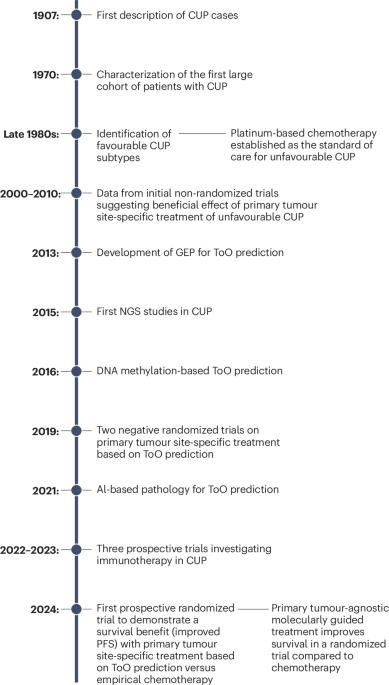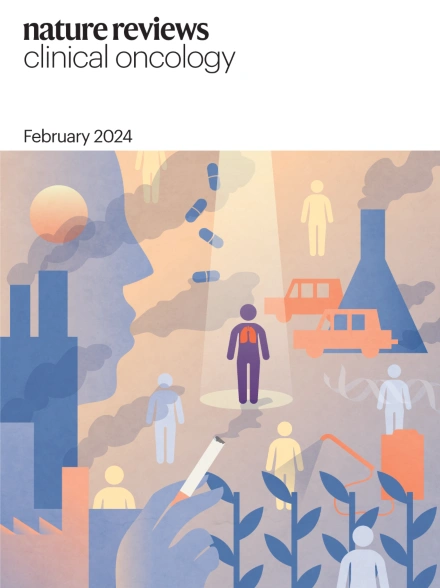重新思考原发不明的癌症:从诊断挑战到靶向治疗。
IF 82.2
1区 医学
Q1 ONCOLOGY
引用次数: 0
摘要
未知原发癌(CUP)是一种转移性恶性肿瘤,尽管进行了彻底和标准化的诊断检查,其原发部位仍无法确定,占所有恶性肿瘤的1-3%。一个不利的CUP亚组预后较差,当接受当前标准护理铂基化疗时,中位总生存期<1年。在过去的几十年里,在阐明疾病生物学和改善不利的CUP患者的预后方面几乎没有取得任何进展,包括最初的随机临床试验失败,无法证明通过基因表达谱鉴定组织起源(ToO)和随后的原发部位定向治疗优于标准化疗。然而,大型队列随机试验现在表明,分子引导治疗改善了具有可操作靶点的CUP患者的预后,无论是在组织不可知的情况下,还是在原发性肿瘤部位特异性的情况下。此外,来自非随机II期试验的数据表明,使用免疫检查点抑制剂的免疫治疗即使对标准化疗后复发或难治的CUP患者也是有益的。此外,大量改进和新颖的策略,包括DNA和RNA测序,DNA甲基化分析,循环肿瘤DNA分析和基于人工智能的病理学,已经被用来促进ToO的鉴定。鉴于这些发展,我们回顾了目前的ToO方法,并比较了支持使用原发肿瘤部位引导方法与组织学不可知方法来管理CUP的证据。我们还讨论了是否可以将CUP视为一种模型疾病,以发展组织学不可知论的精确肿瘤治疗策略。本文章由计算机程序翻译,如有差异,请以英文原文为准。

Rethinking cancer of unknown primary: from diagnostic challenge to targeted treatment
Cancer of unknown primary (CUP) is a metastatic malignancy for which a primary site of origin cannot be identified despite a thorough and standardized diagnostic work-up, and accounts for 1–3% of all malignancies. An unfavourable subgroup of CUP has a poor prognosis, with a median overall survival of <1 year when treated with current standard-of-care platinum-based chemotherapy. Virtually no progress in elucidating the disease biology and improving outcomes for patients with unfavourable CUP has been made over the past several decades, including a failure of initial randomized clinical trials to demonstrate the superiority of tissue-of-origin (ToO) identification by gene-expression profiling and subsequent primary-site-directed treatment over standard chemotherapy. However, large-cohort randomized trials have now shown that molecularly guided therapy improves outcomes for patients with CUP harbouring an actionable target, both in a tissue-agnostic as well as a primary tumour site-specific context. Moreover, data from non-randomized phase II trials suggest that immunotherapy using immune-checkpoint inhibitors can be beneficial even in patients with CUP that has relapsed after, or is refractory to, standard chemotherapy. In addition, a plethora of refined and novel strategies, including DNA and RNA sequencing, DNA-methylation profiling, circulating tumour DNA analysis, and artificial intelligence-based pathology, have been leveraged to facilitate ToO identification. In light of these developments, we review current ToO methodologies and compare the evidence supporting the use of a primary tumour site-guided approach versus a histology-agnostic approach to the management of CUP. We also discuss whether CUP can be viewed as a model disease for the development of histology-agnostic precision oncology treatment strategies. Cancer of unknown primary (CUP) constitutes a diagnostic quandary and has a dismal prognosis, with standard empirical chemotherapy providing limited benefit. This Review outlines diagnostic innovations that are improving tissue-of-origin prediction as well as novel treatment strategies that have shown promise for improving outcomes in patients with CUP.
求助全文
通过发布文献求助,成功后即可免费获取论文全文。
去求助
来源期刊
CiteScore
99.40
自引率
0.40%
发文量
114
审稿时长
6-12 weeks
期刊介绍:
Nature Reviews publishes clinical content authored by internationally renowned clinical academics and researchers, catering to readers in the medical sciences at postgraduate levels and beyond. Although targeted at practicing doctors, researchers, and academics within specific specialties, the aim is to ensure accessibility for readers across various medical disciplines. The journal features in-depth Reviews offering authoritative and current information, contextualizing topics within the history and development of a field. Perspectives, News & Views articles, and the Research Highlights section provide topical discussions, opinions, and filtered primary research from diverse medical journals.

 求助内容:
求助内容: 应助结果提醒方式:
应助结果提醒方式:


